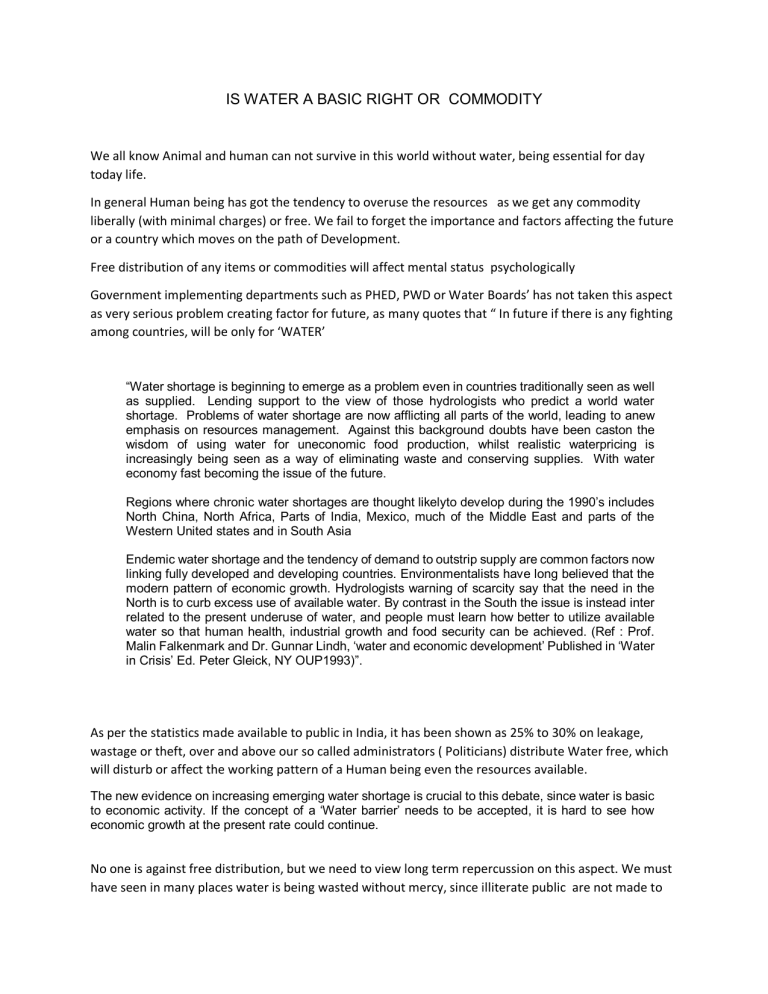Water as a Right or Commodity: Scarcity, Management, Pricing
advertisement

IS WATER A BASIC RIGHT OR COMMODITY We all know Animal and human can not survive in this world without water, being essential for day today life. In general Human being has got the tendency to overuse the resources as we get any commodity liberally (with minimal charges) or free. We fail to forget the importance and factors affecting the future or a country which moves on the path of Development. Free distribution of any items or commodities will affect mental status psychologically Government implementing departments such as PHED, PWD or Water Boards’ has not taken this aspect as very serious problem creating factor for future, as many quotes that “ In future if there is any fighting among countries, will be only for ‘WATER’ “Water shortage is beginning to emerge as a problem even in countries traditionally seen as well as supplied. Lending support to the view of those hydrologists who predict a world water shortage. Problems of water shortage are now afflicting all parts of the world, leading to anew emphasis on resources management. Against this background doubts have been caston the wisdom of using water for uneconomic food production, whilst realistic waterpricing is increasingly being seen as a way of eliminating waste and conserving supplies. With water economy fast becoming the issue of the future. Regions where chronic water shortages are thought likelyto develop during the 1990’s includes North China, North Africa, Parts of India, Mexico, much of the Middle East and parts of the Western United states and in South Asia Endemic water shortage and the tendency of demand to outstrip supply are common factors now linking fully developed and developing countries. Environmentalists have long believed that the modern pattern of economic growth. Hydrologists warning of scarcity say that the need in the North is to curb excess use of available water. By contrast in the South the issue is instead inter related to the present underuse of water, and people must learn how better to utilize available water so that human health, industrial growth and food security can be achieved. (Ref : Prof. Malin Falkenmark and Dr. Gunnar Lindh, ‘water and economic development’ Published in ‘Water in Crisis’ Ed. Peter Gleick, NY OUP1993)”. As per the statistics made available to public in India, it has been shown as 25% to 30% on leakage, wastage or theft, over and above our so called administrators ( Politicians) distribute Water free, which will disturb or affect the working pattern of a Human being even the resources available. The new evidence on increasing emerging water shortage is crucial to this debate, since water is basic to economic activity. If the concept of a ‘Water barrier’ needs to be accepted, it is hard to see how economic growth at the present rate could continue. No one is against free distribution, but we need to view long term repercussion on this aspect. We must have seen in many places water is being wasted without mercy, since illiterate public are not made to What is being offered then is an economic instrument, not a political concept. The realistic pricing of water as a commodity to end subsidies and other uneconomic practices offers a way of eliminating wasteful use and conserving scarce water, which people of all political views agree to be necessaryaware of the availability of resources. Another reason for questioning the ‘business as usual’ approach is the fact that planners have begun to encounter barriers to the further expansions. “As they continue to grow, engineers face the challenge of delivering still more fresh water over longer distances and removing larger waste streams” As an answer to scarcity, most experts are looking to improved water management. Recently For them, the failure to treat water as a scarce commodity is at the root of the problem. The underpricing or free distribution of water is ‘a major economic distortion’. They recommend economic pricing as the instrument for controlling waste and excessive demand. It is easy for the politicians or Administrator to provide Free “Electricity or Water” but the side effect of these activities will not be visible on short term basis. In turn (Tax payer) public will be burdened with taxes which is not a solution for shortage. In India the availability of renewable fresh water resources per capita fell from 6000 Cu. M per year in 1947 to about 2300 Cu. M in 1997. It is estimated that by 2017, India will be ‘Water Stressed’ per capita water availability will be as low as 1600 Cu. M. In a few regions, the water stress will be severe since water resources are very unevenly distributed. Now in 2021 we feel the pinch of the effect What is being offered then is an economic instrument, not a political concept. The realistic pricing of water as a commodity to end subsidies and other uneconomic practices offers a way of eliminating wasteful use and conserving scarce water, “which people of all political views agree to be necessary” It is also to be viewed very seriously that the discharging untreated or semi treated water into river streams, Lakes and Sea also pose major problem on the Quantity &Quality of water. We can feel happy over the Development, but the at the same time polluting the rivers, underground including sea is to be checked by the Administrator. We also need to encourage small package type water and waste treatment plant to small and Medium community where in, we can control misuse of water, since they treated waste water can be utilized within the community area without much hurdle where by limiting the waste and misuse. Take the case history of the country “Venezula” which is in bad shape though it has rich oil content but it could not attain the status of other Oil producing countries because of the free distribution. When we visited some European countries, it is ascertained that excess Milk or many perishable items such as fruits are not distributed freely or liberally, in turn they are dumped in field to serve as organic manure, since Free distribution affects the mental status of normal citizen, because one become sick to working or hard work when he gets food free being a basic items for survival. Due depletion of water resources Government need to switch alternative sources, i.e reuse of treated waste water for secondary use such as toilet, floor wash, Gardening and Agriculture, I feel the reuse of treated waste water to be made mandatory to avoid misuses of water resources or Government must promulgate strict punishment for misuse for car washing and washing floors in factories or over use of any essential ( Life saving) items Government bodies at regional or department level (concerned with areas such as industry, research or agriculture) are charged with the function of ensuring that regulations are adhered to. In conjunction with local committees, the Water Agencies and water consumers, they have the power to refine the SAGE and make proposal for protecting or restoring (conserving) water resources. At national level, the Ministry of the Environment bears the ultimate political responsibility for water, although water legislation impinges on areas covered by other ministries – for example, the Home Office, the Ministry of Agriculture and the Ministry of Tourism, which has special responsibility for bathing waters. For this reason, inter-ministerial initiatives are particularly important in the water domain. Rain water Harvesting also good method for conserving as well as recharging of Ground water, it must become mandatory and an ordinance have been passed for conservation of water resources so that ground could be re-charged the implementation of the act to be followed with stringent regulations. Making rules is good but if it is not implemented to the perfection atleast 90% then formulation of rules will not curb the situation. In the French water industry, 90% of costs are recovered from consumers and polluters. Prices vary from commune to commune depending on physical and geographical factors, on water and wastewater treatment facilities and finally on the level of taxes fixed by the regional Water Agency. A policy of small scale redistribution of costs in pursued, with certain communes receiving subsidies, for example. As in many EU countries, the objective is to make prices reflect as far as possible the real costs of water, a course seen as likely to reduce wastage and promote effective resource management. The total Sewage generation from the urban centres of India grew from around 5 billion lit/day in 1947 to around 30 billion lit/day in 1997. If the treatment capacity of Sewage remains at 20% of the total generation, the pollution load from the domestic sector would be approx. doubled by 2047 from the present level. So, Management of water implies making the best use of available water resources for human benefit which not only preventing and controlling it depletion and degradation, but also developing it in view of the present and future needs. Water, like forest, is a multipurpose resource and it is important to see that it various uses should not conflict with each other and it can be enjoyed in it totality by man and others. Thus, it right allocation, quantitative and qualitative conservation are the primary task before water managers to prove “ IS WATER A BASIC RIGHT OR A COMMODITY”. Ultimately our Future Generation has to face the impact on this sort of “free distribution” which will crumble and collapse the back bone of human life Inference: “Politicians/Elected Administrators must refrain from doing such commitments or implementation so that Each and every living object can enjoy their livelihood without fear” We can conclude with above deliberation, Though water is a Basic Right, it is also a commodity Compiled and Edited By R. NARAYANAN GANNON DUNKERLEY & CO LTD. NEW DELHI 9810055115 .
